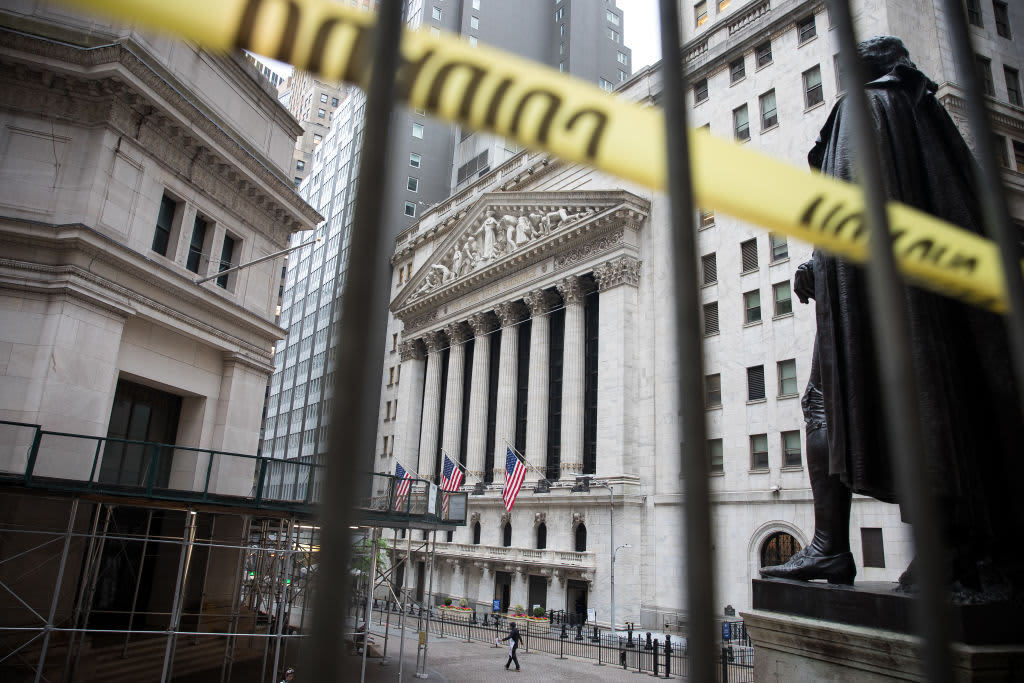A pedestrian passes in front of the New York Stock Exchange (NYSE) in New York, U.S., on Wednesday, June 3, 2020.
Michael Nagle | Bloomberg | Getty Images
The Federal Reserve put new restrictions on the U.S. banking industry Thursday after its annual stress test found that several banks could get uncomfortably close to minimum capital levels in scenarios tied to the coronavirus pandemic.
The Fed said in a release that big banks will be required to suspend share buybacks and cap dividend payments at their current level for the third quarter of this year. The regulator also said that it would only allow dividends to be paid based on a formula tied to a bank’s recent earnings.
Furthermore, the industry will be subject to ongoing scrutiny: For the first time in the decade-long history of the stress test, banks will have to resubmit their payout plans again later this year. They may have to keep doing so every quarter, the regulator said.
“While I expect banks will continue to manage their capital actions and liquidity risk prudently, and in support of the real economy, there is material uncertainty about the trajectory for the economic recovery,” Fed Vice Chair Randall Quarles said in a statement. “As a result, the Board is taking action to assess banks’ conditions more intensively and to require the largest banks to adopt prudent measures to preserve capital in the coming months.”
The move signals that the unprecedented nature of the coronavirus pandemic, and the difficulty in forecasting what the future holds for banks, is making the Fed cautious. Regulators and the industry are keen to avoid the mistakes of the previous crisis, where firms continued to allow billions of dollars in payouts and then had to later raise capital. The biggest U.S. banks already said in March that they would voluntarily suspend share repurchases, which make up roughly 70% of capital payouts for the industry.
What remained were the dividends, which bank analysts have mostly assumed would remain at their current levels – with the exception of Wells Fargo, which is struggling to restore profits after its fake accounts scandal. Still, options market traders have bet that banks would be forced to cut dividends, even at JPMorgan Chase, the biggest and most profitable of the megabanks.
The banks are expected to disclose their capital plans, and whether they actually maintain their current dividend payouts, on Monday, June 29.
On top of the Fed’s typical test, which examines how lenders fare during a severe economic downturn, the regulator looked at three scenarios tied to the current pandemic: A V-shaped recession and recovery, a slower U-shaped outlook, and a W-shaped scenario that would include a double-dip recession.
Since the real economic fallout from the pandemic already exceeds the typical severe economic downturn from previous exams, it is these three scenarios that garner the most interest from bank investors.
While the Fed was careful to say that the scenarios were not predictions of what will actually happen, they do hew closely to what bank executives have said could be the course of the economy: Unemployment would peak at up to 19.5%.
That could cause up to $700 billion in loan losses for the 34 banks in the exam, and the industry’s aggregate capital ratios could fall from the 12% at the end of 2019 to between 9.5% and 7.7%.
While most of the industry would remain well capitalized, in the harsher U- and W-shaped scenarios, several banks “would approach minimum capital levels,” the Fed said. The Fed didn’t disclose which banks would skate close to their minimums, however.
This story is developing. Please check back for updates.
